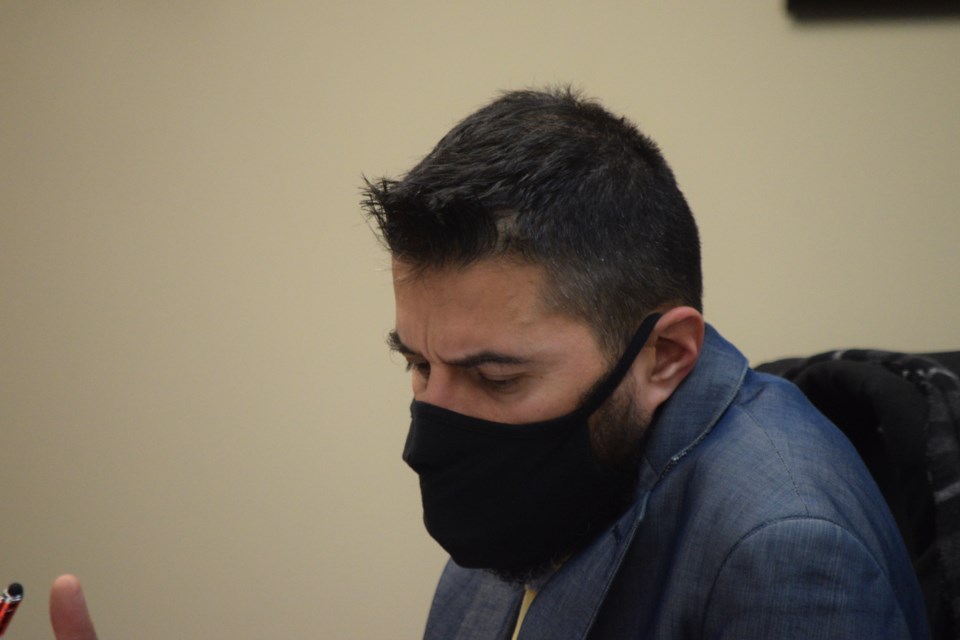BARRHEAD- There might be a time when municipalities, including the Town of Barrhead, draw a line in the sand and say that their municipal fire departments will no longer respond to medical assist calls.
This is what Coun. Don Smith suggested in not so many words during Jan. 11 council meeting after the topic was brought up by Coun. Ty Assaf.
Assaf noted that nearly 50 per cent of Barrhead Regional Fire Services (BRFS) responses in the past year were to ambulance or medical assist calls.
He was referencing chief administrative officer's Edward LeBlanc's report, which stated that in 2021, the fire department responded to 358 incidents accounting for 2,945.75 firefighter hours.
The largest single category was ambulance assists at 186 (including medical death on arrivals at 12), dwarfing all the other categories. Responding to false alarms was the next highest category, followed by rubbish and grass fires at 48, motor vehicle responses at 26 and structure fires. Responding to downed powerlines rescues (four), gas leak investigations (three), mutual aid requests (three), and hazardous material (one) calls round out the bottom.
"I'm looking at those stats, especially at all the hours firefighters are pilling on with ambulance assists and wonder how much longer can it go on," Assaf said. "I know we have a strong 40 member fire department, but how much longer are they willing to put in those hours and just as important, how much longer are their employers going to continue to allow them to keep leaving their jobs?"
Currently, the department has 38 members, 36 of which can respond to calls and two recruits.
LeBlanc began his report by commending BRFS members for their dedication, noting that in addition to the time and effort responding to calls, they also put in 5,451 training hours and put in 18,172 hours of volunteer, non-paid hours.
Assaf then asked about the status of the letters council instructed administration in October to write to Minister of Health Jason Copping and Alberta Health Services (AHS) outlining their concerns about the availability of ambulances and the number of times firefighters respond to medical calls.
"The letters were sent but we haven't received a response," LeBlanc replied.
He added that when the issue first came to council's attention in the summer, he spoke to Alberta Municipalities — formerly the Alberta Urban Municipalities Association (AUMA) — about council's concerns, and was told the organization already had two active committees lobbying for improvements.
Coun. Don Smith echoed Assaf's concerns saying it is getting to the point where the municipalities have to ask the fire chief and deputy chief to look at ways to restrict further the number of medical calls they respond to.
"I know (fire chief Gary Hove) has restructured to the way members respond to medical calls, but maybe he has to take it a step further," he said.
In 2018, Hove changed the department's medical assist protocols to only include responses to the most immediate or critical medical calls.
Since then, he has said the number of calls the department responds to has been significantly reduced, but has also noted in recent months, it has been creeping upwards again.
"Maybe to send a message to the province, we need to say that we are not going to do it anymore," Smith said. "I know we have (close to) a full contingent of members, but who knows what it is going to look like a year from now if they have to continue to do a job that they did not necessarily sign up for."
Smith added he realized that council has said that having the BRFS respond to medical calls is important but reiterated that at some point, the town and other municipalities have to say "enough is enough" and take a stand one day.
"It is the province that is saying that they are not willing to look after its citizens by dropping the responsibility of ambulances on municipalities and their fire departments," he said.
Mayor Dave McKenzie agreed, noting it wasn't just small communities feeling the crunch.
"It is the metros too, where they have no ambulances available for hours at a time. It is becoming a bigger and bigger issue as time goes on," he said. "Whether or not our current provincial government is going to do something about it, we will see, but they are definitely using us to supplement the service that they should be providing."
Barry Kerton, TownandCountryToday.com


